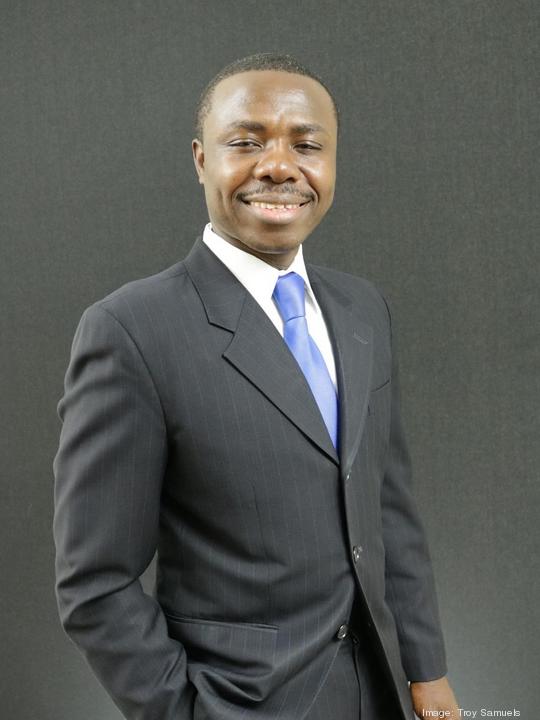
About the business: GCS Fibers, headquartered in Woodbridge, can repurpose high volumes of wet or dry coal ash into six base mineral fibers, which are used to manufacture a wide range of products. It currently has a single machine, but aims to build as many as 100 across the U.S.
How it started: The business has been under development for more than a decade, said Ato Andoh, GCS Fibers CEO. Its largest benefactor, a South Korean family, has invested $30-plus million into development. The first production system was briefly operational in Korea but is currently disassembled and awaiting a move to Blairsville, Pennsylvania, 40 miles east of Pittsburgh.
In the U.S. alone, Andoh said, there are 460 active coal power plants producing 110 million metric tons of coal ash, much of which ends up in ponds or landfills. The patented GCS technology takes that toxic ash and recycles it into fibers that can become paper, cardboard, brake pads, insulation, textiles, rubber, plastics or carbon fiber precursors.
“It is one big machine, and unlike a typical mineral fiber paper/pulp mill, a single production line of ours can produce all the fixed mineral fibers we can make,” said Andoh, who co-founded the company with Sung “Tony” Chough, its president.
Depending on the size of the machine, GCS claims its technology can handle anywhere from 25,000 to 1 million metric tons of coal ash annually. And it can be set up in virtually any industrial park, near any landfill, power plant or factory.
“The amount of ash in the environment is what we’re concerned about” Andoh said. “We want to be able to remove it from inventories, from the dry landfills and wet ponds, so we can have a safer environment, safer communities, and create jobs.”
The pandemic effect: Here’s how the GCS system works, in a very basic sense. First, the toxic coal ash is vacuum-sucked into silos, to avoid release into the air, and then directed from those silos via covered conveyors to the processing system. The ash is dried (if wet), crushed (if too large), processed into large cylinders, melted and then, using different chemicals, spun into various fibers.
This is not cheap. A system designed to handle 100,000 metric tons, Andoh said, is expected to cost $50 million, take four months to build and create 120 direct jobs. A 1 million metric ton system would cost $185 million, take eight months to build and create 500 jobs.
The company is pre-revenue — the system it had running in Korea only produced enough mineral fibers to serve as product-line demonstrations for potential customers, and it is those fibers that will serve as the company’s revenue generators. GCS was in talks with a “large investor who would give us $10 million,” Andoh said, but, as a result of the pandemic, “that deal is off the table.”
“Our coffers were really depleted,” said the retired Marine and former assistant director in Defense Threat Reduction Agency’s Office of Small Business Programs. “Landlords have just been a straight blessing to us, understanding of our situation.”
The pandemic pivot: With no revenue coming in, maintaining GCS Fibers has required the company to become more aggressive in its search for funding, Andoh said. That meant working to source dollars upfront from the likes of energy producers, textile makers and homebuilders — the end users of its fiber products and those that will benefit from the larger reduction in coal ash. Andoh indicated talks are at least underway with several large corporations.
In the meantime, GCS has launched a $3.5 million Indiegogo campaign to bring its existing machine from South Korea to Pennsylvania, where it can be operational in roughly five months. The company’s leaders claim an operational system could generate as much as $5 million in profit every month, which it would leverage to secure additional capital.
The challenge: Beyond the traditional challenges faced by a typical startup, Andoh said GCS Fibers faces the additional hurdle of “getting over people’s doubts, people’s apprehension.” There is a general concern about transporting coal ash, the fact that its system was built in Korea, not in the U.S., and the skepticism of the company’s motives.
“Some might say we’re encouraging the use of coal,” he said. “But even as we turn to clean technologies, the problem of coal ash will remain.”
What’s next: Anywhere coal ash is produced, Andoh said, GCS Fibers can put a factory nearby to recycle it. That’s the goal, to build as many as 100 plants across the United States, including one potentially near Dominion Energy’s Possum Point power station in Prince William County.
“We don’t have time to waste,” Andoh said. “We’ve got to make an impact and do so quickly.”
Email mneibauer@bizjournals.com to share your business with us.